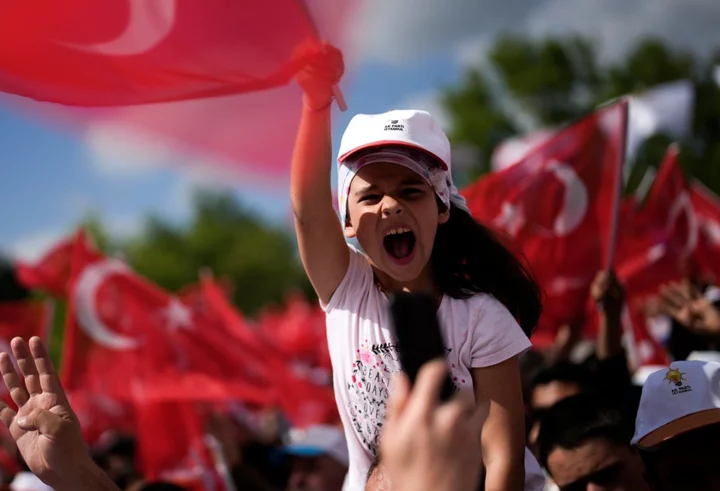Turkey’s President Recep Tayyip Erdogan seeks to strengthen his legacy today as his nation’s most consequential leader since its founder, Mustafa Kemal Ataturk, in an election run-off with major implications.
Mr Erdogan has been campaigning frenetically in the weeks since he exceeded polling forecasts but fell shy of an outright majority in the 14 May first round of the elections, forcing Turkey into a run-off for the first time in its history.
He faces off against Kemal Kilcdaroglu, leader of the centre-left People’s Republican Party (CHP) and architect of a six party opposition coalition which has posed the greatest political challenge to Mr Erdogan in his 20 years as either prime minister or president of Turkey.
The election, on the centennial of Turkey’s founding as a modern republic, carries enormous weight for the country. It is seen as something of a defining moment in its political and cultural identity.
Mr Erdogan represents an Islamically tinged nationalism, with appeals to Turkey’s Ottoman imperial past. Mr Kilicdaroglu and his party have sought to define themselves as European, steeped in an ideology and lineage rooted in Ataturk’s version of secularism.
The election may also impact the dynamics of Nato, of which Turkey is a longtime member, and affect the outcome of the war between Russia and Ukraine as well as ongoing conflicts in the Middle East and North Africa.
Lines at polling stations were reportedly shorter and more relaxed than the first round of the elections, in large part because voters face a simpler single ballot with two candidates rather than the complicated parliamentary choices of two weeks ago.
Mr Erdogan appeared to be doing well in the run-up to the vote despite lingering worries over the economy he has overseen.
“I think the country is doing well,” said Songul Safak, a 36-year-old jeweller who voted for Mr Erdogan. “The economy is doing badly because of the actions of other countries.
In one video clip that went viral, a voter brought her pet lamb to the polls, the fluffy white creature in a striped sweater trundling behind her as she obtained and cast her ballot. Others brought their dogs and pet parrots.
Turnout will be key, with more than 64 million registered voters, including nearly 2 million aboard who have already voted at record rates. Voters are heading to nearly 192,000 ballot boxes set up at school classrooms and community centres. Polls will close at 1700 local time (1400 GMT), with results trickling out an hour later.
“We think that this election’s results will emerge earlier than the last time,” election authority chief Ahmet Yener told local media.
There have been multiple reports of irregularities, including in an incident in the heavily contested southeastern province of Sanliurfa where opposition lawyers seeking to look into allegations of ballot stuffing were barred from a polling station.
Mr Erdogan and his allies control much of the broadcast media and have been flooding the airwaves with his speeches in recent days while giving Mr Kilicdaroglu scant airtime.
Turkey’s mobile phone authority recently barred the use of the country’s text-messaging services for political purposes, disallowing Mr Kilicdaroglu from sending texts to supporters while allowing Mr Erdogan to use the medium in his capacity as a government official.
The country’s election laws were adjusted last year in ways critics said favoured Mr Erdogan. The Organisation for Security and Cooperation in Europe, which monitored the vote, stated in a report that Turkey’s election law “has substantial shortcomings and does not fully provide a sound legal basis for the conduct of democratic elections.”
Crucial issues on voters’ minds include the status of migrants and refugees, national security matters and Turkey’s place in the world. But the country’s spiralling economy remains the top issue on everyone’s tongue and the one most impacting daily lives. The country’s inflation rate is among the highest in the world, and wages have failed to keep up with housing and food costs.
“If it goes on like this Turkey will be Argentina in a few months,” Nevsin Mengu, an independent political analyst and broadcaster, said in an interview, referring to the Latin American country which has been for decades an international poster child for economic mismanagement.
Mr Erdogan has dug deep into the country’s reserves and procured massive credits from Arabian Peninsula and Asian nations to prop up the Turkish lira. “Some countries from the Gulf and such stocked money in our system,” the president conceded in an interview with CNNTurk on Friday. “This relieved our central bank and market, even if for a short while."
Despite his handling of the economy, Mr Erdogan’s path to victory today appears far easier and even assured compared to that of his challenger, opposition party leader Kemal Kilicdaroglu. He drew just short of 45 per cent while Mr Erdogan fell just a few hundred thousand votes short of securing a first-round victory.
Opposition figures tried to remain upbeat. “I see a very high probability of Kilicdaroglu winning the election,” opposition party leader Ali Babacan told reporters after voting.
But the opposition’s poor first-round performance has demoralised its supporters.
“I think the elections are not fair at all, and I think Erdogan will ultimately win,” said Zeynel Circir, a 53-year-old electrical engineer voting in Istanbul.
The first-round performance prompted Mr Kilicdaroglu to shift the tone and emphasis of his campaign from a message of hope and inclusiveness to focus almost exclusively on the several million Syrian and other refugees and migrants in the country.
A victory by Mr Erdogan’s will spur soul-searching and perhaps major changes within the opposition. “The ballot box result is full of messages that need to be examined and lessons that need to be learned,” Istanbul mayor Ekrem Imamoglu, a leading opposition figure, said after casting his ballot.
Yusuf Sayman contributed to this report.

